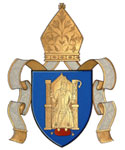 |
 |
News
Bishop addresses Clogher Diocesan Synod in Enniskillen
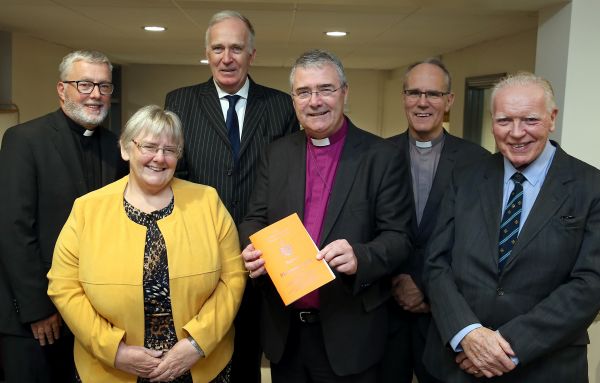
Attending the Clogher Diocesan Synod
The Clogher Diocesan Synod took place in the Cathedral Hall, Enniskillen on Thursday, 26th September 2019 following a Service of Holy Communion in St. Macartin's Cathedral.
The following is the Presidential Address by the Bishop of Clogher, Right Revd John McDowell;
Brothers and Sisters in Christ
Believe it or not I am standing here today giving a Presidential Address to the Clogher Diocesan Synod for the ninth time and indeed on the ninth anniversary of my consecration as Bishop of Clogher. And I do so with equal feelings of gratitude and bewilderment. Gratitude at nine years of steady work and a deepening understanding of the Diocese and you its people. Not everything has gone according to plan and there have been many bumps in the road but we have travelled that road together in faith and hope. Who can tell how successful it has been? We will all know the answer to that one day and probably what seemed to us to be the great realisation of our dreams or the successful working out of our plans will not feature at all in that reckoning which will expose the motives of our hearts much more than the grandness of our plans.
Gratitude also for the many people in this Diocese who have its wellbeing so close to their hearts and who give their time, their talents and their substance so freely to its smooth running. I shall say a little more about that a little later.
And a feeling of bewilderment. I heard a story the other day about a nineteenth century Bishop of Exeter. His name was Bishop Lord Rupert Ernest William Gascoyne-Cecil and it was said that he was the perfect Bishop. Hard working, kind, a good preacher, a deep thinker. A perfect husband and father. His one weakness was a certain absentmindedness. Apparently he once sent a telegram to his wife which read “I’m in London. Why?”.
Before anybody else says it, I am not laying claim to the title of “perfect Bishop” (far from it) but that question “why” has occurred to me from time to time. Why has Providence placed us where we are; in the various roles that we play out on life’s stage? Looking in the mirror in the morning while shaving (that is a time when stray thoughts often come into my head and are to be respected) sometimes even “Why me?”. I’m not certain I can answer those questions very satisfactorily but I do want to say something a little later about the more general question of “why the Church of Ireland?”. Why are we here? And I want to say it in the context of the 150th anniversary of our Disestablishment and Disendowment.
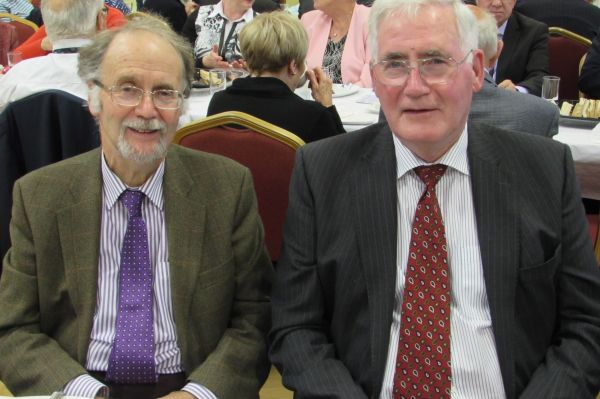
Synod members Jack Johnston Clogher and Will Cowan Fivemiletown.
Some of you may remember that I was scheduled to give a couple of talks/lectures on this subject earlier in the year, in February. Unfortunately the talks had to be cancelled because of my father’s final illness and death. [This is as good a time as any to thank all of you who supported me at that time with you presence and your prayers. As I have often said to people in similar circumstances, there is no good age to become an orphan; so your support and sympathy were greatly appreciated]. I’m going to slip in a very scaled back version of those talks later in this Address along with some comments about what it means for us today. I’ll be doing that in an expanded form later in the Autumn for the Carleton School so if your appetite is whetted, come along.
However before launching into that I want to say a word or two about the ordinary Synod-related business of the Diocese. It’s very far from being the whole work of the Diocese. That goes on Sunday by Sunday and day by day in public worship and private prayer; in preaching and teaching and the administration of the sacraments; in visiting the sick and indeed visiting all parishioners. And in a multitude of other ways. But every organisation needs a structure. As I said in a different context in July, spiritual life itself needs a material basis on which to live and there is such a thing as the grace of good administration and management.
The first area I wish to highlight is in Safeguarding Trust for children and young people and adults at risk. A major policy review at central church level within the Church of Ireland has led to a restructuring of our approach in response to legislation in both Northern Ireland and the Republic of Ireland. As well as the creation of a central Safeguarding Board (and we are fortunate, as is the Safeguarding Board, that Canon Ian Ellis, Rector of Rossorry, serves on that Board) the Children and Young Person’s policy has been revised and an adult at risk policy has been introduced. Without going into too much detail (and there is a lot of detail), a great deal of the responsibility for implementing and auditing the effectiveness of these policies has been devolved to Diocesan Councils and Bishops. The Diocesan Council recognised that the scale of what we were being asked to do would have been simply impossible to achieve using our current resources and also given the legal and moral seriousness of the consequences of any shortcomings.
It is for that reason that the Diocese engaged the services of Mr Michael Skuce on a part-time basis to help me and the Council implement the new policies which included the recruitment and training of volunteers (and we need to stress that word) as the Diocesan Safeguarding Team and also the Diocesan Safeguarding Panels, and to evaluate how the policies are being implemented and bedding in. We are extremely fortunate in this Diocese to have people, often very senior in their own full-time vocations, who have been prepared to give their time and talents to these tasks. On behalf of the Diocese I am very grateful to them. We are grateful also to Michael Skuce for the organisational abilities and skills and sheer enthusiasm which he brings to this task...far beyond the limited hours for which he is contracted.
Michael is also helping us along the weary road of reviewing and deepening our GDPR policies but his Safeguarding work has taken priority.
I think now is a good time to say something about what might become the intolerable burden which regulatory regimes are demanding of voluntary organisations. The Church is a significant provider of services especially to young people but also to adults of all ages. Although there are times when we could have been done better and other occasions when the Church actually inflicted grave harm, for the most part those services have enriched the lives of individuals and communities for hundreds of years. And they are organised and delivered on an almost entirely voluntary basis. And that culture of voluntarism is frankly being undermined by an obsession with regulation that isn’t particularly nuanced or, at times, even proportionate.
As a church we are probably in greater danger of atrophying and withering through the excessive demands on our volunteers on Select Vestries, Diocesan Boards and Council, Youth Organisations and other fellowship groups, than we are from doctrinal or other spiritual matters. And I know this is the experience of many other Christian traditions and indeed non-religious groups. And it needs to be taken into account.
Aside from this burden it has also become very clear to me as I go around the Diocese and speak to those involved very close to the ground that the traditional model of self-sufficient and stand-alone parishes or groups of parishes probably cannot be sustained for very much longer.
The breadth of skills necessary to maintain and run a parish no longer exists in a single person no matter how gifted they are and it is clear that much greater collaboration will be needed between parishes and within groups of parishes than has been the case up to now. For instance a group of three parishes needs a total of 18 “officers” if you take into account churchwardens, glebewardens, treasurers and secretaries. A union of three parishes would require just 10 (if there are still church buildings in each of the parishes).
It is also worth thinking about just how much closer a spirit of cooperation is to the spirit of the Gospel than a spirit of competition or of utter independence. Even where a full union of parishes isn’t or can’t be achieved there is no reason why informal collaboration shouldn’t be explored.
I would encourage you also to explore external funding opportunities. Mr Henry Robinson ran an excellent funding information evening just before the summer which was very useful and very well attended. I know (or at least I think I know) that Henry would be happy to expand and repeat that exercise again in the future to help equip parishes to find financial and other resources that are often going a begging.
Also when I’m on the subject a plea to make greater use of the Church of Ireland’s own Priorities Fund which only a small number of parishes have tapped into. And, while I’m about it a suggestion to the Priorities Fund that it might move away from a concentration on physical infrastructure and concentrate much more on helping to build up the human capital and resources which are necessary to an organisation which frankly has too many buildings already but needs to find new ways of resourcing volunteers and volunteering.
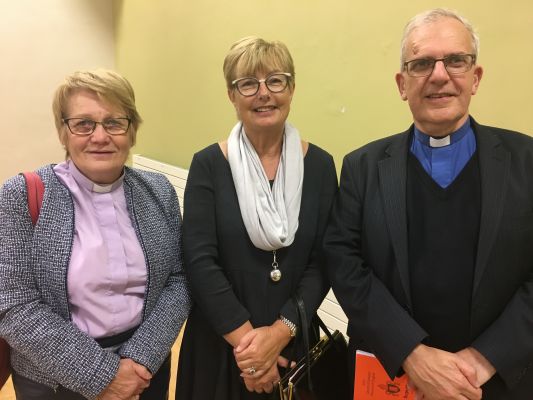
Revd Margaret Pringle with Mrs Ethne McCord and Canon Maurice Armstrong.
And while I’m still on the subject of buildings I do want to say some positive things. As I have said we have a lot of buildings in this Diocese. Churches, church halls, and glebes, among others. With a very few exceptions these are well cared for and looked after. In many parishes there are also substantial building and refurbishment projects going on. In any one year I am usually asked to preach and dedicate such work in five or six parishes. That is a clear indication of how close to your heart these places are. Although Christianity is a religion of spirit and truth, it is also an incarnational religion. The Word was made flesh. So for many of us our spiritual lives, our spirituality, the way we relate to God is inextricably bound up with our places of worship in particular. They are almost always the place where we (consciously at least) first felt the presence of God. Thank you for keeping them so well.
We are also fortunate at the minute to have an exceptional group of rural deans who undertake their work very diligently. As you know we have had an unusually large number of parish vacancies (I think just a blip) and the Rural Deans have been particularly busy. In addition a number of them, but mostly Chancellor Berry, have been covering in the Clones Rural Deanery which has meant yet more meetings. It may well be that I will ask Synod next year to consider amalgamating six into five Rural Deaneries as a possible solution. All of this is only possible due to the willingness and expertise of the Rural Deans and of course the very effective work which Robert Forde does as Glebes Secretary aided as he is by other lay people who serve on the Glebes Committee and who make themselves available to attend and assist at Glebes Inspections.
I want also at this point to draw Synod’s attention to the work, now nearly complete, of the Property Project which has been carried out by Henry Robinson. This has involved a great deal of work in the archives and online in the Land Registry but has resulted in a database of Diocesan and parish property including details of title and maps. I know that Henry will be sharing his project results with individual parishes and is also willing to undertake updating the database on an “as required” basis. Henry’s work along with that of Robert Forde and Michael Skuce and Brian Donaldson are excellent examples of how the expertise and willingness of people who have held very senior positions in secular employment can be brought to bear for the benefit of the Diocese and at excellent value for money.
One final “practical” matter before moving onto what may appear to be a bit remote. The Diocesan Council introduced a Music Bursary Scheme about six years ago. The Scheme subsidises the music tuition of players and singers who commit to a certain level of involvement in the musical life of their parish. It is intended to be help enrich our liturgical life (not to compete with it). The take up has been good but not spectacular and I would commend it to your parishes for consideration.
I know that those people proposing and seconding the Report of the Diocesan Council will have more to say about the work undertaken during the year so I would like to turn now to the subject of the 150th Anniversary of Disestablishment and related matters.
First, if you will bear with me, a little historical summary:
The Irish Church Act passed in July of that year and which came into effect on 31 December 1869 completed the nineteenth century parliamentary reform of the Church of Ireland. The Church Temporalities Act of 1833 had reduced the number of its archbishops to two and its bishops by ten down to the current number of ten. It also began a period of financial reform within the Church. The Tithe Commutation Act, 1838, abolished the support by a largely Catholic and Presbyterian population for the clergy of the Church of Ireland. Now, in 1869, the Church of Ireland, united to the Church of England since the Act of Union in 1801 was to be separated, disendowed and disestablished. Fiercely opposed at the time, the Church’s Disestablishment was its liberation.
In a longer perspective the Act of 1869 was more far reaching still. It dismantled an established status that, as the Ascendancy, had endured for over 200 years. The peculiarly English Reformation Settlement involving church and crown in parliament had been replicated in the very different social, cultural, political and religious context of Ireland. The Church of Ireland, a church largely of planters and the Pale-and not a majority of either- was accorded a privileged place in government and society. It is not for nothing that, until the late eighteenth century, Archbishops of Armagh lived at a palace in Termonfeckin near Drogheda. In the first place it wasn’t safe to live in Armagh because of local hostility but even when these circumstances changed and it was perfectly possible for the Primate’s to live there, they preferred to be nearer Dublin and the Castle.
But it is also very important for us to take note of the fact that the separation of church and state in Ireland took place a full two generations before Partition. Whatever might otherwise have happened, Disestablishment enables the Church of Ireland, like the other churches to continue as one church in two civil jurisdictions. This has allowed it (perhaps required it) to speak to either civil jurisdiction conscious of its place in the other and to speak to both from a grounding in the Kingdom of God.
Disestablishment therefore set the Church of Ireland free to be what it is, a minority tradition in the Body of Christ, a church on the same standing as others in the family of God, one branch of the True Vine. Ours is a church, that, tracing its history through the often-complex history of these islands cherishes its identity as Catholic and Reformed. It retains the three-fold order of Ministry that it has received and through them its inheritance from the churches of the Apostles. It upholds a particular spiritual and theological tradition deriving from Hooker and Cranmer enriched by Catholic, Evangelical and Charismatic experience. It is part of a world-wide communion of churches and of developing ecumenical institutions. Now as one tradition among many in a secular age, it must be comforted, commissioned and empowered by its Lord to be as salt, that little quantity in the mix, which sterile in quantity, brings life and taste to the whole.
Without being backward looking or inward looking we have much to thank the Disestablishment generation for, particularly in the financial and administrative arrangements which they devised in very short order and which have survived more or less intact right down to today. We must also recognise the confidence, faith and courage of the clergy who, almost to a man (and I’m afraid they were all men in 1869) commuted their government pensions to form the basis of the General Fund of the Representative Body and without which the Church of Ireland probably would not have survived, at least in its island wide form.
But there are one or two matters about establishment and Disestablishment of the Church which we would do well to acknowledge and learn from today. I will have a good deal more to say about these matters at the Carleton Summer School in October when I will try to address the subject “Disestablishment: what have we made of it?”. But for now one or two important points which historians have long known and written about but which the church and its leaders such as me need to say.
First, that Establishment and all the Acts of Parliament that supported it over the years were not only intended to give the Church of Ireland a privileged position far beyond its numbers. At best only 12% of the population of Ireland ever belonged even in the most nominal sense to the Church of Ireland. Establishment and those acts of Parliament were quite consciously designed as an instrument of government policy to destroy another Church (the Roman Catholic Church) and to seriously disable a third one (the Presbyterian Church). Methodism escaped the worst of these disabilities because one of its branches (the Primitive Methodists) retained an institutional link with the Church of Ireland right down to 1912).
That is the clear historical truth of the matter and it is something which we need to acknowledge was unchristian certainly by the standards of the nineteenth century. And even then our forbears, chiefly the bishops, fought tooth and nail to retain our privileged position and with arguments that were as self-serving as they were specious fought in vain particularly in the House of Lords to prevent the passage of the Irish Church Act. Magee, then Bishop of Peterborough and eventually Archbishop of York but who had been a curate here in Enniskillen was one of the great orators of the day. He defended Establishment to the bitter end and it was said of him that “If eloquence could have justified injustice he would have saved the Irish Church”.
And secondly to note that the “Establishment mentality” of the Church of Ireland didn’t cease with the passing of the Irish Church Act. Certainly over time we learnt not to depend on Big House generosity for our wellbeing. Certainly we learned to stand on our own two feet financially and indeed spiritually (the Church of Ireland has always been the most clearly “Protestant” of the Anglican churches of these islands). Indeed the vestiges of that establishment mentality have had some positive effects particularly in our preparedness to be open to all who wish to call upon our pastoral resources and (within limits) a certain inclusiveness and liberality which has a national church feel about it at its best.
But there have been downsides too. Here in Northern Ireland a certain cosiness with the State which in a non-establishment sense was still able to “look after our interests”. But a church and a mentality that is concerned chiefly with its own interests can hardly be called a church at all. It is simply a self-regarding self-preservation society at prayer. We have not been called to look after our own interests but to promote the interests of Jesus Christ as his disciples loving our neighbour as ourselves. It was a bishop of the established church who once said that it was an Irish Protestant’s duty “to love God and to hate the Pope”. And indeed a very refined (this time English) bishop who described prayer book worship as “the mean between the gaudy meretriciousness of the Church of Rome and the squalid sluttery of a Protestant (ie Presbyterian) conventicle”. Those are not sentiments which will find an echo in the passionate and sacrificial love which saturates the Gospel.
In the South of Ireland our default position has been solidarity and survival. And in the circumstances of the Irish Revolution and in the early years of the State there was a certain amount of sense in that. But now, nearly 100 years into to establishment of the State we could perhaps be seen to be making a clearer and more distinctive contribution to the common good, as, for instance I believe we do in our contribution to education.
As a result of this rather strong self-preservation instinct both North and South it’s not that we’ve done much harm except from time to time. But we have prevented ourselves from doing much good in society. It has prevented us from being that leaven which we are called to be. And on this island to use our unique position to facilitate the sort of critical dialogue between and within the different jurisdictions on this island.
Before I draw this address to a conclusion I want to highlight and emphasise some words which I used earlier when I was talking about the consequences of Disestablishment.
I had said that as church alive and well in both jurisdictions on this island there was a requirement that we should speak, conscious of our place in the other and speak to both from a grounding in the Kingdom of God. Last year at this Synod I had some cautious and cautionary words to say about Brexit, the outcome or even the reality of which, was still very uncertain. But whatever uncertainty existed then has now been deepened by all sorts of developments since and, whatever happens, has brought the whole of the UK to what a leading University of London academic expert has called a “constitutional moment”. Who knows where we will be socially, economically and politically in just over a month’s time much less a year’s time.
Insofar as I have had anything to say about these matters (and the church and its leaders have a duty as an important element in civil society to say something sometimes) I hope I have done so from a Kingdom perspective where the love of one’s neighbour is the guiding standard. I hope you will remember in your private and public devotions the complex and far reaching events which will unfold (I suspect quite rapidly) in the weeks to come. Pray for wisdom, honesty and discernment on the part of our governments. Pray that what beginnings of peace and integration which we have in this part of the world are sufficient to help us understand one another in a world where barriers are going up rather than coming down.
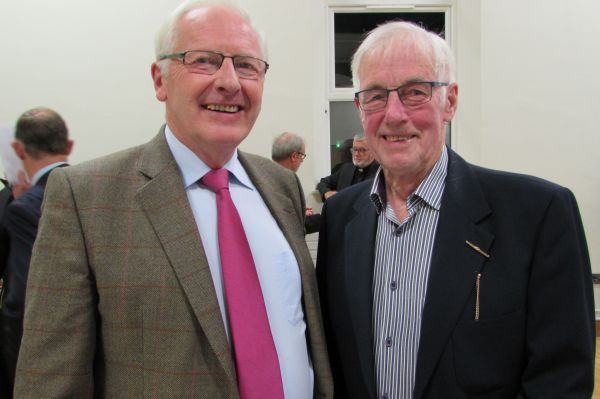
Charles Crawford Sallaghy with Stanley Atwell Fivemiletown at Clogher Diocesan Synod.
And finally to some thanks. As many of you will know Ruth McKane who worked in the Diocesan Office for about 12 years left us at the start of the year. Ruth had built up a very deep and wide ranging knowledge of the Diocese and its systems. However she will be missed as much for her positive, cheerful outgoing nature. We are delighted that Sabrina has been able to take up some of Ruth’s duties three days a week.
We have had relatively few clergy comings and goings since last year although it is good to be able to welcome the Rev’d Philip Bryson to Synod as the rector of Kilskeery and Trillick rather than as the curate-assistant of Magheraculmoney.
The set up in the office has benefitted from Glenn Moore’s return to about three quarters of full time working although each of you who has occasion to consult Glenn or ask his advice will know that he still keeps very unsocial hours. This year again I need to thank Ashley our Diocesan Accountant for her unending patience and the lengths to which she is prepared to go to provide advice on wide range of financial matters and particularly her dedication to keeping the Diocese and the parishes up to speed and up to scratch in relation to Charities legislation. When we come to the accounts and financial information in the Diocesan report you will also see evidence of Ashley’s tidy mind and keen professional skills.
I would like also to thank David Daniel who has acted as our Diocesan Webmaster for the past number of years. David not only redesigned the website,and helped us troubleshoot, especially when we experienced hacking but he also designed and set up an excellent online Glebes Inspection Reporting system, a resource which David is prepared to support after he has formally stepped down as webmaster. David we are very grateful to you for your diligence and expertise in the dark arts which so few of us understand.
As I said at the beginning of this Address we have much to be thankful for but also much to think about and much work to do. In my first Diocesan Synod address in 2011 when I had been your Bishop for less than a week I remarked that (comparing myself with distinguished predecessors and in terms of Strictly Come Dancing) you were exchanging Anton du Bec for John Sergeant. I hope I’ve learned a few more steps since then and have certainly benefitted from some good teachers. I mightn’t quite be up to the standard of “Hit the diff” yet but I look forward to another year of honest and cheerful work in this part of the great Vineyard.
May God guide us this evening and on every day in the future as we go about his work for the building up of his Church and for the honour and glory of his Name.